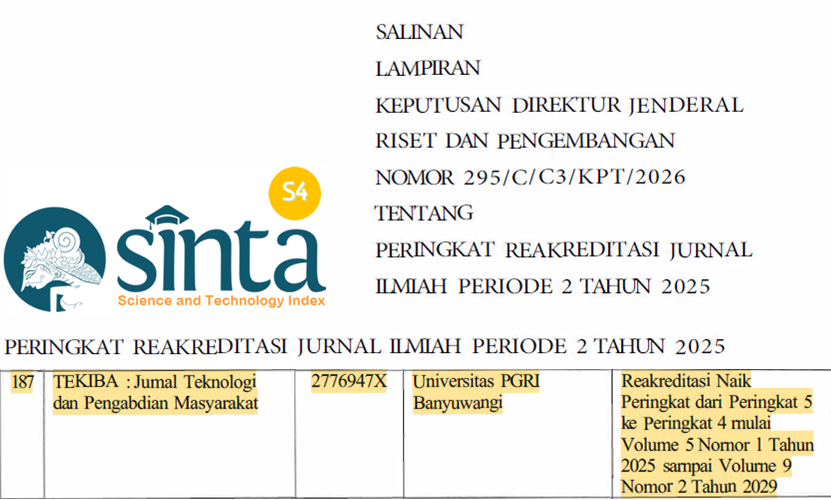Sosialisasi Handsanytizer Otomatis Guna Mencegah Penularan Covid-19 bagi siswa-siswi TPQ Darussalam di Banyuwangi
DOI:
https://doi.org/10.36526/tekiba.v1i2.1509Keywords:
Covid-19 , Handsanitizer; students TPQ DarussalamAbstract
The purpose of this Community Partnership Program (PKM) activity is to provide knowledge about the importance of maintaining personal hygiene to prevent the spread of Covid-19 which is increasingly widespread among children. Partners in the activities of TPQ Darussalam students. Stages of activity 1) Planning at this stage the activities carried out are, observation, writing proposals, preparation of socialization materials, preparation of making automatic hand sanitizer tools, debriefing materials, 2) Implementation and socialization. The results of this activity are 1) socialization of automatic hand sanitizers can prevent the transmission of Covid -19 and increase public understanding and knowledge, especially students of TPQ Darussalam, Purwoharjo. 2) the availability of automatic hand sanitizer products in the students of TPQ Darussalam, Purwoharjo. Socialization activities for the use of automatic hand sanitizers and socialization to prevent the transmission of Covid-19 need to be carried out regularly.
References
Yunus, N. R., & Rezki, A. (2020). Kebijakan Pemberlakuan Lock Down Sebagai Antisipasi Penyebaran Corona Virus Covid-19. SALAM: Jurnal Sosial Dan Budaya Syar-I, Volume 7(3), pp. 227- 238.
Handayani, D., Hadi D R., Isbaniah, F., Burhan, E., & Agustin H. 2020. Penyakit Virus Corona 2019. Jurnal Respirologi Indonesia. Volume 40(2), pp. 120-128
Susilo, dkk. 2020. Coronavirus Disease 2019:Review of Curret Literatures. Jurnal Penyakit Dalam Indonesia. Volume 7(1), pp. 45-47.
Thalib, Abdul. 2020. Herbal Potensial Sebagai Hand Sanitizer di Indonesia : Literatur Review. Pasapua Health Journal. Volume, 2(1), pp. 31-38.
WHO. (2020). Coronavirus disease (COVID-19) advice for the public. Available from:https://www.who.int/emergencies/diseases/ novel-coronavirus- 2019/advice-for-public. Accessed on Maret 22, 2021
Kampf, G., Todt, D., Pfaender, S., Steinmann, E,. (2020). Persistence of
coronaviruses on inanimate surfaces and their inactivation with biocidal
agents. J Hosp Infect.104(3):246-51. doi: 10.1016/j.jhin.2020.01.022. Accessed on Mei 22, 2021
Ervianingsih, Astari, C., Zahran, I., Hurria, Mursyid, M., & Samsi, A. (2020). Pencegahan COVID-19 dengan pembuatan dan pembagian hand sanitizer di Universitas Muhammadiyah Palopo. Indra (Jurnal Pengabdian kepada Masyarakat) , Volume 1(2), pp. 45-48.
Fatimah, C., & Ardiani, R. (2018). Pembuatan hand sanitizer (pembersih tangan tanpa air) menggunakan antiseptik bahan alami. Prosiding Seminar Nasional Hasil Pengabdian, Volume 1(1), pp. 336–343
Mahmood, A., Eqan, M., Pervez, S., Alghamdi, H. A., Tabinda, A. B.,
Yasar, A., & Pugazhendhi, A.
(2020). COVID-19 and frequent use
of hand sanitizers; human health and
environmental hazards by V
GEDC0053JHJexposur https://doi.org/10.1016/j.scitotenv.2020.140561
Ismawan, B. (2010). Herbal Indonesia Berkhasiat. PT. Trubus Swadaya. Depok.
Downloads
Published
Issue
Section
License
Copyright (c) 2021 Ratna Mustika Yasi, Anas Muhktar, Malik Yuhanas

This work is licensed under a Creative Commons Attribution-ShareAlike 4.0 International License.










